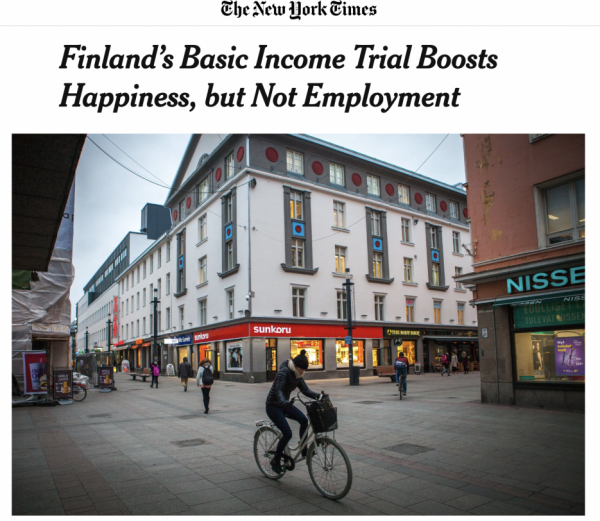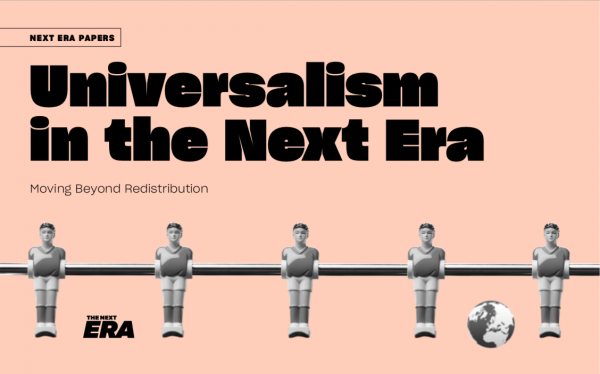It has been exciting to read the news and commentaries on the preliminary results of the Finnish basic income experiment. Seldom if ever have we seen so many articles published on an academic study almost in real time, written by journalists, experts and enthusiasts from all over the globe. Two…
It has been exciting to read the news and commentaries on the preliminary results of the Finnish basic income experiment. Seldom if ever have we seen so many articles published on an academic study almost in real time, written by journalists, experts and enthusiasts from all over the globe.
Two thousand unemployed people were selected to participate in the nation-wide basic income experiment in Finland that ran from 2016 to 2018. The participants received 560 euros every month no matter what their other earnings were. Normally all income would need to be reported to the public unemployment office and could be used as a reason to cut the amount of the individual’s unemployment benefit.
The goal of the experiment was to study how lifting the bureaucratic burden and easing the threat of falling to income traps affects the employment status of the participants of the trial.
Disappointing results?
The results of the preliminary study covering the first year of the experiment were neutral: the basic income recipients neither worked nor earned more than those in the control group. The majority of Finnish politicians and the media interpreted this as a negative result because basic income did not encourage the participants to work more. On the other hand, many foreign commentators perceived the results as a success because the unconditional benefits did not reduce motivations for work.
We argue for a broader notion of universalism, comprised of other assets and not only limited to money.
As a side note, this was pretty much what researchers had anticipated when the experiment was designed. When a new incentive like unconditional benefit is rolled out, there is a significant delay in the people’s behavioural change, which is visible after 3.5-5 years. Hence a trial restricted to two years due to political budgetary reasons does not reveal how people would live in a society with a fully fledged basic income system.
These differing interpretations can help us to better understand the debate on (universal) basic income. This debate has been one of the few truly globally spread political debates, alongside climate debate. However, there are several discourses on the basic income, motivated by different issues and drivers in different societies and contexts. The Finnish experiment was motivated by one set of issues, which are commonplace to the Finnish political context, yet it was interpreted from various other contexts and was thought to represent a more generic UBI case than it ever did.

Article by The New York Times in February 2019.
Discerning five ideals behind the basic income
1. The goal of encouraging people to work whenever possible.
A central claim of proponents is that UBI increases the number of tasks and actions that people can reach without having to worry about falling into income traps. This discourse is typical for mainstream political groups in developed countries and when discussing welfare models suitable for the emerging gig and freelance economy. As mentioned above, this was also the primary goal of the Finnish basic income experiment.
2. The goal of universal basic subsistence.
This goal of abolishing poverty is acute both in developing economies that lack of comprehensive welfare schemes but also in industrialised economies. In wealthy countries where robots and AI are capable of constantly learning new things and are eager to explore, they are thought to threaten employment and income patterns. This discourse is typical when discussing welfare models for developing countries and preparing economic policies for end-of-work futures.
3. The goal of equal opportunities.
The prospect of upward social mobility as a reward for individual effort and hard work is thought to form the psychological mechanism that keeps societies together. However, this tends to require investment from an individual in order to improve their own future prospects – typically in education, apprentice and internship periods, time to search for a new job or to relocate to a new region. UBI would be a tool to enable these type of investments for people who spend all their active hours earning an amount of money that can barely cover the very basics.
4. The goal of self-determination and autonomy.
In other words, liberating people from monotonous and meaningless work. This goal is motivated by the ideal that when people are provided with conditions where they are not always burdened by concerns about their basic needs, they are capable of learning new things and are eager to explore new opportunities. In principle, our era of abundant information has erased many of the technical restrictions that have hitherto prevented this ideal. Earning a living still demands significant time, however. Therefore jobs that could instead be performed by machines should disappear. The new combination of livelihood and freedom of information will lead to a new type of prosperity. This discourse is typical for the new radical left and many techno-utopians with great faith in the liberating power of exponential technologies.
5. The goal of fair redistribution for the wealth-accumulating digital era.
The digital, global economy has enabled the most successful businesses to collect wealth in an unforeseen manner. Meanwhile, substantial numbers of people in rich and middle-income countries struggle to find the same kind of well-paying jobs that the previous generation enjoyed. Growing employment insecurity and precarious conditions have prompted calls for a new type of income distribution where the wealthiest part of the population would distribute their acquired wealth to the rest of the population and thereby even the prospects for all to enjoy the benefits of the recent development.
Promising free money for everyone keeps us far from the ideal of universalism
In other words, while the Finnish experiment was a variant of goal 1, many people observing it wanted to see it as a case exemplifying goals 2-5.
This is not very surprising. Social security systems are still the symbols of the political synthesis of the great industrial age, something that reconciled the contradictions of the industrial revolution. The ongoing post-industrial transformation is undermining the strength and resilience of these mechanisms, hence the expanding discourse on inequality and a huge appetite for radical policy initiatives such as the UBI.

The Income Narrative Vs. The Asset Narrative. The Asset Narrative sees people as holders of different types of assets, of which money is just one.
However, it is good to acknowledge that the Finnish basic income experiment was not a test of universal basic income (UBI) as such. It targeted only part of the population, those with a long unemployment history. It did not aim to build universal structures, something that all members of a society would share and be entitled to.
And yet it might be precisely this feature and ideal, universalism, that can address the demands of this transformational period: create a sense of belonging, renew the promise of fair distribution of wealth and expand the scope of equal opportunities. Promising ‘free money for everyone’ is always a provocative proposal that catches attention for sure. However, it is far from self-evident that cash and income would be the most effective way of implementing the ideal of universalism.
We need new universalism
In our recent publication Universalism in the Next Era – Moving beyond Redistribution we suggest that it is not sufficient to merely reform systems of redistribution. Instead, what we need is new universalism that can tackle our diminishing sense of belonging. Since the mid-20th-century universalism has been an integral part of the Nordic model. Following that tradition, it is important that society provides the same services and benefits that support well-being to everyone; not only to certain special groups or to the most vulnerable groups. Universalism starts from the assumption that well-being with respect to people’s lives is quite a comprehensive issue that cannot be resolved simply by improving material resources.
Therefore we argue for a broader notion of universalism, comprised of other assets and not only limited to money and income. It is not merely enough to focus on the expansion of public services and welfare benefits, a standard solution used when building the successful welfare states of the 20th century. Instead, we should be courageous enough to re-define the roles of different assets and the rights people should have to those assets.
These innovative, progressive policies would be a proactive response to the emergence of the digital economy and its increasingly data-driven forms of value creation.

Universalism should be more than just a way of redistributing wealth. Demos Helsinki’s vision paper ‘Universalism in the Next Era’ examines social security in a broader perspective.
Follow @leksis and @demoshelsinki to continue the discussion on Twitter. Download Universalism in the Next Era – Moving Beyond Redistribution here.
